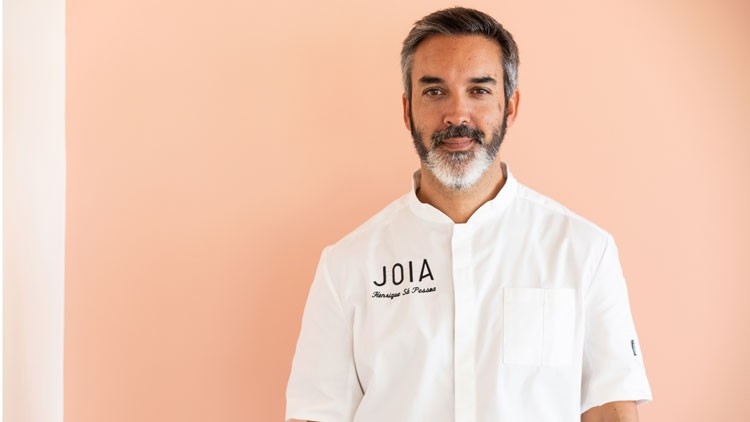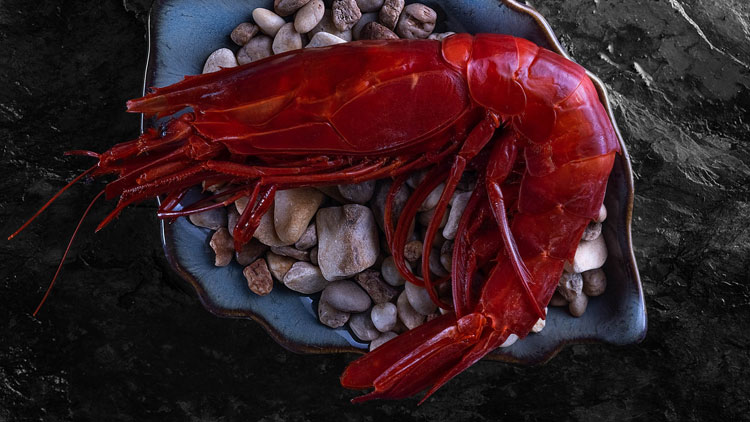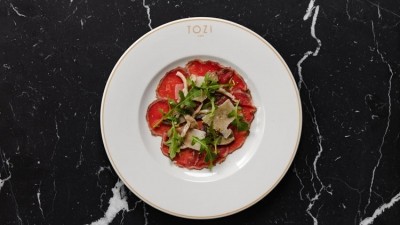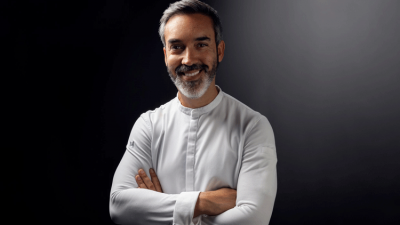Henrique Sá Pessoa: “It’s important to move people’s understanding of Portuguese cuisine forward”

How did the opportunity to open JOIA first come about?
It came about during the pandemic. I was contacted by PPHE [the hotel group behind art’otel] in late 2020 who pitched the idea of opening a restaurant in London, and I was immediately interested. Portuguese cuisine is on the horizon in London. Chefs like Nuno Mendes and Leandro Carreira have given it greater profile, and more people are engaging with the country’s gastronomy when they visit Lisbon or Porto, so the timing of this project is quite good. We’ve been developing the concept for JOIA for over a year now. It will comprise three distinct spaces, a 15th floor restaurant, a bar on the 14th floor, and a rooftop bar with infinity pool, all overlooking Battersea Power Station. The food will combine elements of Catalonian and Portuguese cuisine.
Why not just focus on Portuguese cuisine?
As well as Alma, I run another restaurant in Lisbon called Tapisco, which has an Iberian focus. The Iberian Peninsula is rooted in my culinary heritage, and I wanted to bring elements of that to JOIA. Spanish cuisine is also something that’s very present in London, so it made sense to incorporate it. Last year we launched a restaurant in Amsterdam with PPHE called ARCA, which will be a sister restaurant to JOIA. Although the concept is different – this is much more ambitious, particularly in terms of the size of the project – the essence and the DNA is quite similar, and it’s really worked over there.
You started your career in London, so JOIA must feel like something of a homecoming for you. What it always a city you wanted to return to?
It was always something that I felt, given the opportunity at this stage of my career, would make sense. London can be a very slippery city for high-profile foreign chefs coming in; we’ve seen lots of French, Italian and Japanese chefs make a success of it, but others have found it harder to find their place. In recent years, though, we’ve also seen some success with Spanish chefs and concepts like Barrafina; and what Nuno is doing with Lisboeta, which is going really well. It shows me that the timing is right. The key is to make sure you come with a concept that fits into the London scene. We’re not doing fine dining, it’s not a fussy restaurant. JOIA incorporates a relaxing ambience, good service and nice food in a beautiful venue, and my objective is to deliver on that expectation.
What can we expect from the menu?
It’s important to move people’s understanding of Portuguese cuisine forward. I get frustrated as a lot of people still think of Portuguese food as being all sardines, salted cod and custard tarts, but it’s much more vibrant than that. I don’t want to just showcase the classic dishes, I want to show good cooking while being a Portuguese chef. Of course, there will be Portuguese ingredients and traditional Portuguese recipes, but I’m not limiting myself to just following a few conventional ideas. I’ve travelled a lot and cooked in Sydney and London, I’ve also lived in the US, and all my influences are going to be incorporated in the cooking.
You operate restaurants across a number of countries, what’s the biggest challenge right now when it comes to opening and running a restaurant?
The biggest one right now is staff. Everywhere I go in the world, everyone is desperate for the same thing and that’s skilled staff, and any staff in fact – we’re talking across all levels. Becoming a chef in the past 20 years or so has become a more popular vocation, but it’s still a hard craft with long hours. After Covid a lot of people changed their perspective about the industry, and it’s in our hands now to motivate people to come back to the industry and find inspiring ways and incentives for them to return. The days of long shifts, for example, are over. We need to adjust to the new generation of chefs, waiters and restaurateurs; and that by far is my biggest challenge.
Has JOIA been designed with Michelin in mind?
I don’t think you should ever start a project with aspirations like that, you should just be focusing on serving good food in a good environment. Although the ego of the chef is now dominant in most projects, it’s still down to the balance of service, ambiance and food. If you ask me in two years’ time if JOIA could be a Michelin contender, I don’t know. There are restaurants in London that are quite casual but still have Michelin recognition. It all depends on the direction of the restaurant. For me it’s much more important that the restaurant is successful and achieves the aims I set out for it at the start.
Do you aspire to have further restaurants in London?
If I were to open more restaurants then JOIA would have to be a huge success first, so now all my focus is on that. And if it does do well then there are opportunities that can arise, and I will always be open to that. It’s hard to come from outside and do well in London. We’ve seen a lot of big-name chefs, especially from Spain, that come to London having attained two or three stars and been on The World’s 50 Best list, and things don’t go exactly as planned. I don’t want the focus to be on me and my accolades as a chef, I want it to be on JOIA and whole team working to make that restaurant a success. That’s my focus right now, and from there a lot of good things can happen for sure.














